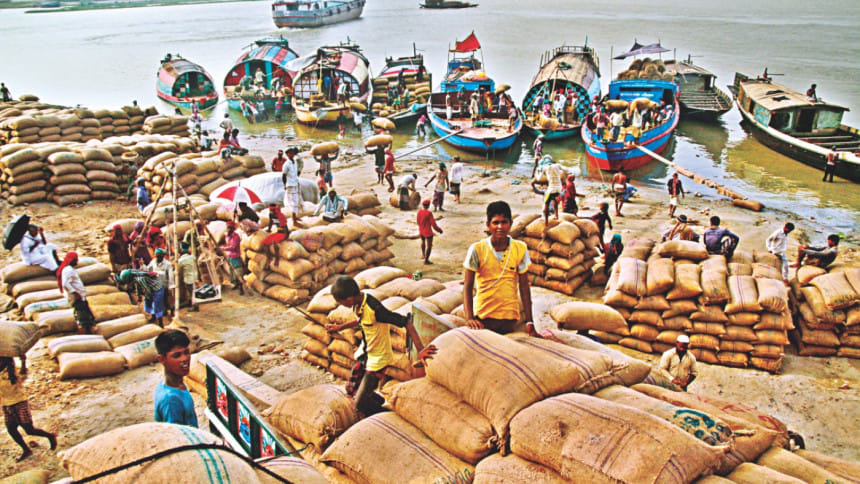Boro farmers at the mercy of middlemen

When the government had declared at the very beginning of the harvesting season that it would buy a higher volume of paddy directly from farmers, Boro growers across the country pinned high hopes on the domestic food procurement scheme.
But two weeks have gone by since the paddy and rice procurement drive was officially launched on May 5 and thousands of the Boro growers still remain at the mercy of private buyers and middlemen.
The farmers are being offered much less by the buyers and the middlemen than what the government had promised under the public procurement scheme.
The reason farmers are losing out is because in reality the government rice-buying drive has not started yet. Thanks to procedural delays, the food directorate is yet to open its silos for farmers to sell paddy and rice.
As per a late April decision, the government is supposed to complete procuring 13 lakh tonnes of paddy and rice from Boro growers between May and August.
Contacted, Ilahi Dad Khan, director (procurement) at the Directorate General of Food, acknowledged the situation and attributed it to the district food officials not getting Boro farmers' lists from the agriculture officers concerned at the grassroots.
Golam Mawla, food controller of Lalmonirhat, said they were not being able to start buying rice due to the delay in getting the list.
It is almost the same all over the country as reflected in the official procurement figure which has not yet reached the 500-tonne mark in past two weeks.
As a result, farmers' expectation to get price benefits out of the public grain procurement has not met.
Farmer Mohammad Hasan Ali, who reaped 37 maunds of paddy (1 maund = 37.37kgs) out of his 84 decimals of Boro land in Tangail, couldn't be happy when he was offered Tk 600 for a maund of paddy.
Though this fetched him almost no profit, Ali still cultivates paddy as he said, "Paddy cultivation does not require anyone to invest all the money at once. Besides, I also need rice to feed my family.”
Afsar Ali is a farmer of Aditmari in Lalmonirhat.
He has been selling his harvested Boro at Tk 12 a kg, which he considers lower than the production cost.
Abdul Gafur, another farmer from the same district, told The Daily Star that they got elated at government's announcement of buying paddy at Tk 23 a kg but said they are still in the dark about when they would be able to sell rice at government silos.
Angered by low prices of rice, several hundred farmers took to the street on Tuesday halting traffic on Thakurgaon-Dhaka highway for half an hour. The farmers of Jagannathpur and Nargoon unions who blocked the highway at Khochabari Haat in Thakurgaon demanded fair price of their produce.
Abdul Wadud Dara, chairman of the parliamentary standing committee on the food ministry, said, "In previous years, the middlemen used to get the price benefits out of the government food procurement scheme. But this time, field officers of the agriculture department are making sure that lists of genuine farmers are prepared.
“…we'll send the money [price of their produce] directly to their [farmers] bank accounts."
The ruling party lawmaker said he had asked the director general of the food directorate to expedite the procurement process.
Ilahi Dad Khan said though 70 to 80 percent of farmers had their bank accounts opened, many accounts might have become dormant in absence of regular transactions.
"We've asked all our field officials to make sure that banks cooperate in keeping the farmers' accounts active and we'll also make sure that money is transferred to the accounts of the farmers,” said Khan.
He hoped that by early next week the procurement drive would gather momentum with all lists of Boro farmers ready at every district.
Though Boro was cultivated on 48 lakh hectares of land last year, the acreage has shrunk to 46.85 lakh hectares this year, mainly due to low prices of the produce last year. Besides, there have been some flash flood related crop losses early in the harvesting season in the northeastern haors.
Agriculture officials, nonetheless, are optimistic about achieving a bumper Boro output of 1.9 crore tonnes. If that happens, the total rice production this fiscal year would go a little over 3.47 crore tonnes, equalling the previous year's output.
Of the three rice seasons in Bangladesh, Boro is the biggest contributor to the staple production. The other seasons are Aus and Aman.
Earlier on April 24, in a major policy shift, the government decided to procure seven lakh tonnes of Boro paddy directly from farmers, in addition to six lakh tonnes of rice, from May 5 through August 31.
The prices have been fixed at Tk 23 for a kilogram of paddy and Tk 32 for a kg of rice.
According to government estimates, farmers' average production costs for each kg of paddy and rice are Tk 20.70 and Tk 29.
In the previous years, the government used to buy mostly rice (9/10 lakh tonnes) and barely one lakh tonne of paddy, which would benefit mainly the rice millers and middlemen with the price incentives.
Speaking on condition of anonymity, an official of the Food Planning and Monitoring Unit of the food ministry said the government officials concerned have to deliver this time and try to implement the "direct-purchase-from-farmers policy".
Otherwise, the farmers will lose interest in farming the economically less lucrative rice, they noted.
(The Daily Star's Thakurgaon correspondent Md. Quamrul Islam Rubaiyat, Lalmonirhat correspondent S Dilip Roy and Tangail correspondent Mirza Shakil have contributed to this report.)

 For all latest news, follow The Daily Star's Google News channel.
For all latest news, follow The Daily Star's Google News channel. 








Comments